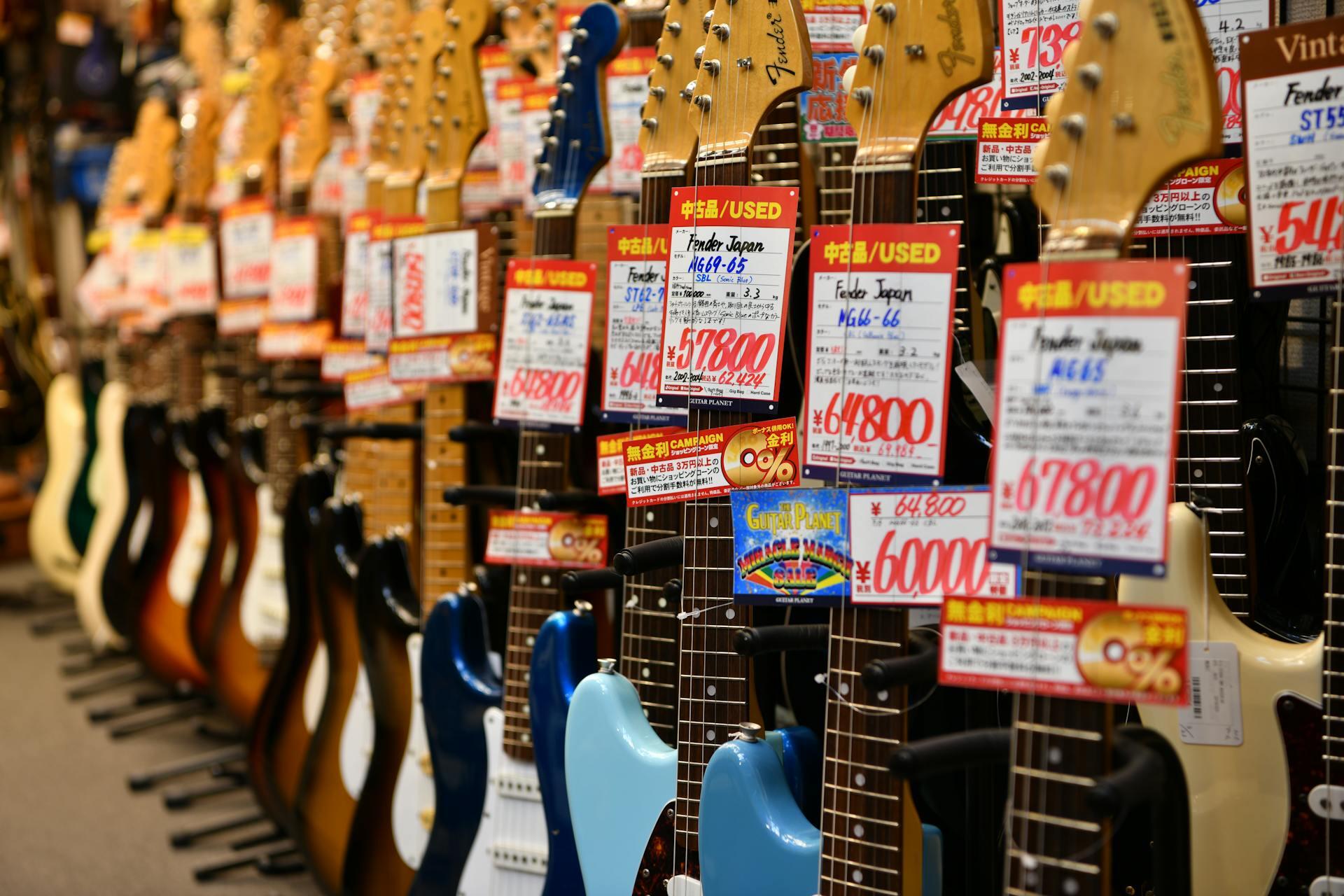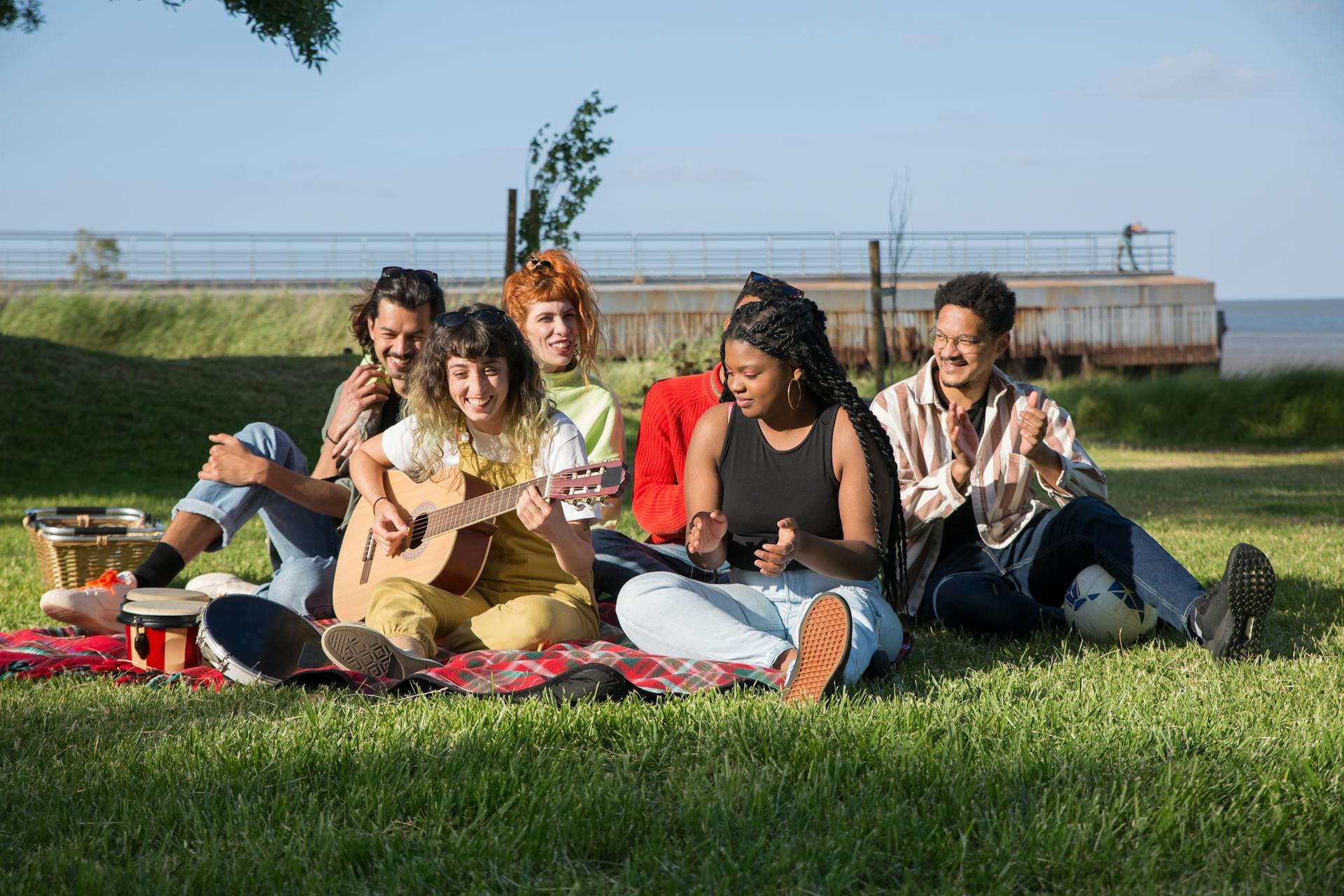Want to learn guitar and bring melodies to life at your fingertips? The guitar isn’t just an instrument – it’s a gateway to creativity, expression, and endless possibilities. As one of the oldest and most beloved instruments, the six-string continues to capture the hearts of millions across the world, with its presence growing stronger in every generation of music lovers.
It’s not just an instrument that you pick and play because you enjoy it as a hobby or a path to becoming a musician. Similar to any sport, it engages your mind, sharpens your coordination, and even provides surprising health benefits, such as helping with focus, memory, and even stress relief. So, basically, every chord you strum and every melody you perform builds more than music; it builds skill, confidence, and showers you with lots of health benefits.
The guitar is more than an instrument – it’s an experience.
In this article, we’ll guide you through everything you need to get started: the benefits of playing guitar, how to get started, and where to find quality lessons in Singapore. Whether you’re a complete beginner or looking to sharpen your skills, stick around and discover how to unlock your full potential with this timeless instrument.
Ready to start your musical journey? Let’s strike the first note!


How to Start Learning Guitar (Practical Tips for Beginners)
If you’ve decided to finally pick up the instrument, the first thing to know is that anyone can do it–no matter your age or background. So, don’t think too much about this, okay? The smartest approach to begin is to break things into small, achievable steps and avoid being overwhelmed by everything at once. A lot of people aspire to achieve too much at once, which is why they quit halfway through the journey.
First, ask yourself why you wish to play the guitar. Is it for fun, to join a band, to make music, or to perform live? Knowing your reason will help you plan the proper path – choosing the type of guitar, finding lessons, and setting a practice routine that keeps you consistent. When you know exactly what motivates you, sticking to the journey becomes a piece of cake.
When you start your journey, decide whether you’d prefer an acoustic, acoustic electric or an electric guitar. All three have unique sounds, but what matters most is what you’d enjoy performing and feel comfortable in your hands. Acoustic guitars are great for simple strumming and songwriting, while electric ones are perfect for rock, blues, or even metal. It doesn’t matter what you choose; simply make sure it suits your goals and style.
The truth is, the guitar is more than just an instrument – it’s a tool for expression and creativity. It doesn’t matter what you choose; simply make sure it suits your goals and style.
So, what’s next?
Before or after getting your guitar, don’t forget to take time to learn the parts: the frets, strings, and pickups, and what each does. You’ll be able to play it confidently when you know what each part is and what they do. Once you have your instrument, focus on the fundamentals: how to hold it comfortably, how to tune it, and how to start with open chords.
These are the foundations of almost every track. With just a few chords such as E minor, A minor, D major, and G major, you can play hundreds of songs. You can pair this with string-by-string exercises to strengthen your fingers. At first, it may hurt, but with regular practice, your hands will adjust, and playing will become second nature. As the saying goes, practice makes perfect!
You need to remember that consistency is the most effective way to learn guitar or any skill, in this case. Even 10–15 minutes a day of focused practice can build muscle memory, rhythm, and confidence. Instead of cramming, spread your sessions across the week. Treat it as a long-term plan, because when rushed, you will feel burnout very fast and might give up. For example, a monthly plan with small milestones will help track your progress and celebrate wins over the long run.
The golden rule here is: Patience over rushing.
If you wish for quicker results, consider taking structured lessons. A tutor can give you real-time feedback, correct mistakes before they become bad habits, and answer your questions as you go. When you can ask questions and receive clear feedback, you’ll know exactly what to adjust and correct. That’s what we look for when learning a new skill. Why? Because it saves you from time-consuming trial and error, and keeps your learning efficient.
There’s no single “perfect” method to learn. Some people thrive on apps, others on self-teaching, and many with private lessons. What matters is finding the most effective method that works for you. Remember to go at your own pace, stay consistent, and most importantly, enjoy learning the instrument. If doubts creep in, don’t fall for the common myths about guitar – we’ve covered those in this article to keep you motivated.
Questions to Ask Yourself Before Picking Up the Instrument
Before you dive into learning guitar, it helps to reflect on a few important questions. These will guide your journey, help you pick the proper lessons and tutors, and make sure you stay motivated over the long run.
- Why do I wish to pick up the instrument? Is it for a hobby, to join a school band, or even to perform professionally?
- What kind of music would I enjoy performing? Rock, blues, country, pop? This will influence whether you get an acoustic or an electric model.
- What’s my current lifestyle – am I a working adult or a student? How much spare time do I realistically have each day for practice?
- How many hours per week can I dedicate to studying the instrument without it becoming time-consuming or overwhelming?
- Have I successfully learned something (a language or another musical instrument) on my own before? Did I stick to a plan and see progress?
- Do I want structured lessons with a tutor, where I can ask queries and get feedback while playing, or do I prefer self-teaching with apps and guides?
- What’s my budget for private lessons with an instructor?
- Do I understand the fundamentals, or should I take a lesson first to build confidence?
- How comfortable am I with practising small routines every day to build finger strength and get better at keeping the beat while playing leads?
- What’s the most effective method for me personally to learn – step-by-step lessons, private or group classes, or in-person or online courses?
- Am I prepared to work through the discomfort of sore fingers and keep going until it becomes simple and natural?
- How will I track my progress over time – through a structured monthly plan, by recording myself, or by checking in with a tutor for playing feedback?
By thinking about these points earlier, you’ll know exactly where to begin and which way to learn guitar works most effectively for you. You can add more to the checklist if you have other concerns or priorities – the list is flexible. This reflection saves you from frustrations and regrets and prevents time-consuming mistakes in the future. It ensures your learning stays enjoyable instead of overwhelming. For beginners, starting with simple genres such as pop, folk, or blues makes the journey smoother and keeps it fun and consistent.
We hope you’re clear on how to get started in this journey. Your next question might be: where to buy a guitar in Singapore? Let’s find out!

Where to Buy Your First Instrument: Guitar Shop Singapore Guide
The next exciting step is getting your very own instrument. This is, of course, if you don’t own one already. You can opt for a brand new or a secondhand – whichever fits your budget. Many people prefer online shopping these days. While online shopping is convenient, visiting a shop in Singapore offers the chance to hold different models, test how they feel, and get expert advice before choosing.
This is especially helpful if you’re a beginner and have no prior knowledge of the instrument. In most cases, as a beginner, you’ll benefit from trying out an acoustic or electric guitar in person. Shops allow you to pluck the strings, feel how smooth they are, and check whether the neck is comfortable for your fingers.
This hands-on experience is something no website can provide for you. It also gives you the chance to ask queries about size, setup, and which model suits your goals from the staff at the shop. You can also give custom orders if you have a specific design in mind. Don’t worry, we’re not stopping you from buying online. You can, if you know exactly what you want to buy or if the model is only available online. As a beginner, we suggest you visit the shop and experience it.
Budget is also an important factor. Stores might offer packages that include beginner guitars and tuners as part of a monthly plan, or you can choose to pay the full amount upfront – whether in cash or by card. While it might feel tempting to go for the cheapest option, consider it an investment. A slightly better-quality instrument and a brand that lasts for some time will make practice sessions far more enjoyable and accompany you in your journey for many, many years. So, avoid getting something cheaper or low quality, especially when committing to an instrument that you’ll be spending a lot of time with.
Now, shall we take a look at the stores in Singapore where you can consider getting your brand new guitar?
| Shop’s name | Address |
|---|---|
| Davis Guitar Music Centre | 3 Coleman St, B1-40/41 Peninsula Shopping Complex, Singapore 179804 |
| TC Acoustic Store @ The Adelphi | 01-17 The Adelphi, 1 Coleman St, Singapore 179803 |
| The Guitar Shop Singapore | 5 Coleman St, #B1-30 Excelsior Hotel, Singapore 179805 |
| City Music Co Pte Ltd | 701 Sims Dr, #02-05 LHK Building, Singapore 387383 |
| Swee Lee Flagship The Star Vista | 1 Vista Exchange Green, #01-07 / 08 / 09 / 10, Singapore 138617 |
| Music Connoisseur Singapore | 231 Bain St, #03-35, Complex 180231 |
| Guitar Connection | B1-02/03 Peninsula Excelsior, Singapore 179805 |
| Ty Music Center (TYMC) | Excelsior Shopping Centre, 5 Coleman St, B1-32, Singapore 179805 |
| 35 Guitar Avenue | 35 Selegie Rd, #01-30 Parklane Shopping Mall, Singapore 188307 |
| RIVERTREE MUSIC | 5 Coleman St, #B1-11 Excelsior Shopping Centre, Singapore 179805 |
| Luther Music | 5 Coleman Street, #02-16 Excelsior Shopping Centre, Singapore 179805 |
| The Music Works @ Tai Seng (Musical Instruments Showroom) | 1 Upper Aljunied Link, #04-04 Joo Seng Warehouse, Singapore 367901 |
You can go through the store suggested above and find the one that’s closer to your budget. Do you happen to know more places or your go-to shops? Do let us know in the comments!
There you go! We have covered the essentials and also the places where you can get your first instrument to begin your journey. Now, let’s take a look at the benefits it offers when you play it. What could be the benefits? Let's go into the next section to find out!

Why You'll Never Regret Learning the Guitar
Whatever the time period, the guitar has always been an attractive, even captivating, musical instrument. It’s the ideal tool for impressing others as well as for expressing oneself freely through one’s own compositions or by performing timeless melodies.
There is no ideal age for picking up the instrument: whether you’re 8, 18, 38 or 68 years old, age makes no difference. From the moment that you feel the urge to play the guitar, once the motivation is there, well, that’s the perfect moment to begin.
What’s more, you can play all the musical styles that you want – blues, rock, pop, reggae, funk, punk or even classical. That’s why acoustic, amplified, and classical versions exist!
You only need to select the model that suits you. This tip will help both complete newcomers and more experienced players.
All the same, to be certain that the sounds you’re making aren’t tempting your family and neighbours to cry, we recommend learning the fundamentals of this tool through structured lessons or step-by-step video guides. Don’t forget tuning either! But you'll have to learn a bit of everything - from power chords to the major scale, from fingerpicking to advanced guitar tricks - to ensure you are getting everything you can out of your new instrument.
But beyond technique, whether it’s the joy of performing or recreating your favourite tunes, engaging with the instrument carries a wealth of benefits for both well-being and health.
It’s a Scientific Fact: It Brings Pleasure
Let’s be clear, it’s not only this instrument – all musical practice brings real pleasure.
According to a neuroscience study at the University of McGill in Montreal, Canada, listening and performing on the instrument releases hormones such as dopamine, the “happiness chemical.”

The study also proves something many of us may have already wondered for the longest time: the more you immerse yourself in music – whether listening or performing on the instrument – the more pleasure your brain rewards you with.
So put aside the idea that it’s all about progressions, tabs, and memorising tunes. Yes, those are part of the journey, but it’s far more than that. Some of the world’s most famous players built their legacy by turning practice into pleasure, showing just how powerful this instrument can be.
It Helps Relieve Stress
We all have really full days from time to time, and whether it’s in our private sphere or professional milieu, some are more stressful than others, right?
Between your boss who aggravates you, bills that come at the worst time, traffic jams, bad weather, and terrible dates, there are a thousand and one reasons to be stressed during the day.

Fortunately, once you have your own Gibson Les Paul or Telecaster, plug it into a Marshall amp, and you pluck those first notes, the stress will fade away in no time at all.
With a few indispensable accessories such as a pick, a capo, and a metronome, you are ready to go! You’ll be performing in the style of Clapton soon enough…
Whether you take classes with a private instructor, follow an online course, or play alone in your room, the effect is the same: the effect is the same: you unwind through making music.
According to a double study led by Loma Linda University in California and its School of Medicine, stress is significantly reduced as soon as one plays an instrument.
And these virtues have been recognised since the origins of the instrument itself!
This manifests itself on a genetic level: musical vibrations impact our blood pressure and immune system, which helps us fight viruses.
So yes, it's good for your health! If that’s not motivation enough to start learning, I don't know what is? If you’re interested in diving deeper, the history of the guitar shows just how far this incredible instrument has come through the centuries.

It Takes Away Pain
If you have chronic pain or are suffering physically or psychologically, picking up the instrument and listening to your favourite artists allows your spirit to disconnect, considerably reducing pain.

By focusing on intonations, musical vibrations, music theory, or memorising your favourite tracks, you’ll focus less on pain, allowing your body to relax and your spirit to escape.
A study at the University of Utah with the Center for Pain Research illustrated these effects of music on the body.
It Boosts Brain Activity
A recent Scottish study illustrated that if you practice the instrument, as with any other instrument, you are able to sharpen your cerebral functions and activity.

This is notably beneficial for the fight against mental degeneration in the short and long terms.
So, “fret” no more! Stop taking pills for increasing your cerebral activity, and instead tune a guitar, take lessons, consult your tablatures, study and play scales, and your brain will thank you. Are you fantasising about that fretboard yet?
It Improves Your Heart
Did you know that rockers have rock-solid cardiovascular systems?
Indeed, Dutch researchers have discovered that people who devote at least 100 minutes per day to practising an instrument have significantly lower blood pressure and steadier heart rates compared to those who don’t.
This fact was included in another study by Boston’s Berklee School of Music, led by the chair of the Music Therapy department, Suzanne Hanser.
Making tunes has a real impact on our health, especially for the elderly, as it slows down the heart, and lessens stress, anxiety and depression.
While you’re completely absorbed in your instrument, carried away by what you produce, your blood pressure falls to normal levels and you feel more relaxed.
And if you learn to sing at the same time as you play, this will also have a positive effect on your lungs, by making them work to their full capacity of oxygen.
It Boosts Your Self-Confidence
Yes, it's an excellent outlet.
While singing brings an immediate health benefit, in general, creating your own tunes allows you to freely express yourself, your emotions, ideas, and who you are to others.

In expressing yourself completely and without censure on your guitar, you will liberate a strong emotional charge, which will heighten your self-confidence.
Singing a melody or playing a piece of music may prove to be easy for some, but creating, composing, and inventing one represents an entirely different personal challenge. As soon as you’ve done it, you will have gained an enormous amount of confidence in yourself.
Every songwriter has the knowledge that he or she is fully capable of inventing something unique.
It Improves Your Creativity and Your Concentration
The more you practice, the more your brain absorbs information: once you’ve picked up the fundamentals, such as tuning, basic scales, hand coordination, and simple picking exercises to try out your first solos, you’ll find yourself eager to keep on learning.
It’s as though you put your finger inside gears, and it’s impossible to get out of them.

Once you’ve built a solid foundation through private lessons, you’ll be able to go beyond the essentials and create something more expressive – and that’s a real confidence booster.
According to an important study from the prestigious University of Cambridge, musicians and especially guitarists, continue to be creative even when they’ve stopped playing their instrument.
They’ve invested so much into their music that their entire environment becomes a pretext for composing or making changes to their work.
It Increases Your Power of Attraction
Yes, it’s a cliché. But it’s also a scientific fact.
The guitar reinforces your power of attraction. Researchers in psychology have made music-based studies that illustrate how people more freely associate musical capacity with intelligence, commitment, determination in work and physical prowess.

Why are many people attracted to guitarists?
Here are three reasons that show why the guitar is ideal for impressing others:
- They are seen as being more creative and imaginative than other people. This also has to do with the amount of charisma they give off.
- The neuroscientist Daniel Levitin explains that melody produced on the instrument draws most of the lobes of the brain and the emotions that it generates. In sum, guitar music connects with our deepest emotions that are impossible to control.
- The myth of the nonconformist: it’s pretty much a fact that the guitarist is synonymous with freedom, even at the expense of social rules. Enough said!
And what if we said that mastering the instrument is a remedy for ageing?
In conclusion, we can affirm that the instrument is the ultimate remedy for boredom and depression. It relaxes guitarists and brings numerous physical and mental benefits.
So be kind to your neurons by plucking the wires of your Gibson or Fender Stratocaster, similar to your favourite artists!
Get your daily dose of serotonin, endorphin and oxytocin! If you’re looking for inspiration, try learning easy tracks for beginners to wow the crowd – or even impress your crush.
Learn Guitar with Superprof’s Talented Tutors
We’ve come to the end of this article – thanks for sticking around! You’ve learned about the many benefits of picking up the instrument and tips to get started. Earlier, we mentioned tutors, and now it’s time to share why we think they can make such a difference.
You might be wondering: Why do I need a tutor when the internet is full of free resources? Fair point –we agree, too. While self-study works for some, the truth is that it’s demanding and can be too overwhelming to do everything on your own. This is not something that everyone can pull off–sometimes, people need help, and it’s completely okay. We are not in competition with anyone here.
That’s where a tutor comes in. Having a tutor gives you personalised feedback, accountability, and structured guidance–things you won’t always get from online resources. With a tutor, you can ask for clarifications, get live guidance, and know exactly what to work on next. This saves you from developing bad habits that can delay your progress.
Are you worried that it can be troublesome to find a tutor? Don’t worry, we have just the perfect platform for you to begin your lessons – Superprof. With over 22,842 verified tutors in Singapore alone, you’ll easily find someone who matches your goals and style. The cool part? You don’t even have to leave the house. Yep, from the comfort of your own home!
Getting started is simple:
- Head over to our website and create an account (you don't have to pay for this).
- Enter the subject in the "subject" field and your location in the “postcode/address” field.
- Browse through tutor profiles, where you’ll see their background, qualifications, teaching style, and student reviews.
Even better, you can message tutors directly to discuss your goals, ask about lesson formats, and decide whether you prefer learning online or in person. Superprof also lets you connect with tutors worldwide, so if the tutor for you is across the globe, lessons can still happen–anytime, anywhere.
Here’s another coolest part: many tutors offer their first guitar lesson FREE, giving you the chance to try before you commit. With an average price of just S$35 per lesson, you’ll find a tutor who meets your goals!
If you’re dreaming beyond just playing for fun, remember that there are careers you could explore as a guitarist, from teaching and performing to session work and music production.
Growth takes patience – focus on steady progress, and you’ll see your skills flourish with each step forward.
Summarise with AI:















